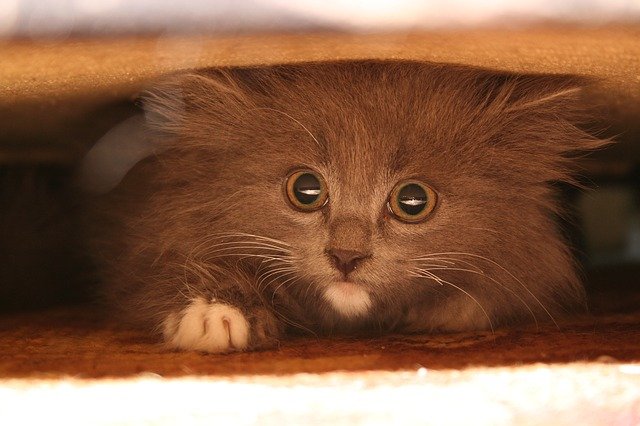
What To Do If Your Cat Has Anxiety
Many owners who come to our clinic worry about whether their cats are suffering from anxiety. As opposed to dogs, which tend to suffer from acute causes of anxiety, such as when their owner leaves the house, or loud noises, cats tend to have generalized anxiety over changes to routine like visitors to the house, construction or furniture being moved around.
What an Anxious Cat Looks Like
Cats tend to express anxiety through either over-grooming (to the point of losing hair or giving themselves sores) or inappropriate bathroom behavior (urinating or defecating outside the litter box). If your cat is having either of these problems contact your veterinarian to rule out other medical problems and to discuss environmental and pharmacologic interventions that can be tried.
Finding the cause of your cat’s stress
Cats are much more mysterious than dogs when it comes to why they are anxious. (Learn more about dog anxiety.) Sometimes there is an obvious trigger like construction workers coming in and out of the house, or a new puppy or baby being introduced to the house.
Subtle triggers for cat anxiety
Other times it can be something subtle like a new feral cat in the neighborhood walking by the window or a piece of furniture that was moved around. If you can identify the trigger and change it, that’s great — but more often than not we don’t identify the reason for the anxiety or we can’t change it.
Helping Your Cat Deal With Stress
There are some things you can do to help anxious cats though.
Keep a routine: I’m sure you’ve noticed that your cat knows it’s 7AM breakfast time even if daylight savings means that your clock says it’s 6AM. Keeping a regular routine is always a good idea when it comes to cats. Try to keep feedings and litter box changes on a set schedule to keep your cat from getting stressed out.
Give your cat a nest: You can also make some changes around your house to reduce stress. Installing resting/hiding places that are higher up in the room so that your cat can look down on the room and get away from any dogs or children if they want to will help to let them feel like they are in charge of their world. If it is possible to give them access to a window that they can look out, or better yet, a screened in porch or outside play area, that can be very good for a cat’s emotional well-being.
Extra litterboxes: Another general recommendation is to have one more litterbox than you have cats. So if you have 1 cat you should have 2 litter boxes, and if you have 3 cats, you should have 4 litter boxes, and so on. The more variety in the type of box and the location the better. Litter boxes should be scooped at least once daily and the box cleaned and litter changed once every 1-2 weeks.
Pheromones can help cats de-stress
Like dogs, there is also a pheromone spray for cats which works well to reduce anxiety. It is called Feliway and there are a number of sprays, diffusers and scratch pads that you can buy. I have had a lot of success with this all natural treatment for anxiety and I recommend it to any owner of an anxious cat.
See a veterinarian
If you have made all the changes to the environment you can, and your cat is still having inappropriate, anxious behavior then we can try pharmacologic interventions to help give him or her some relief.
Anxiety can be a very frustrating problem but you are not alone and there are many options to help your pet. Contact us today to schedule an appointment if you are concerned about anxiety or any other medical problem.
— Dr. Shawn Budge
Essex Middle River Veterinary Center provides medical and surgical care for cats and dogs at our animal hospital and veterinary clinic in Essex, Maryland, just outside of Baltimore. Our services include preventive wellness care exams, vaccines, spays/neuters, and a variety of specialized care. Our state-of-the-art veterinary offices are conveniently located near I-695 where we see pets from Towson, Honeygo, White Marsh, and other neighboring Baltimore areas.
